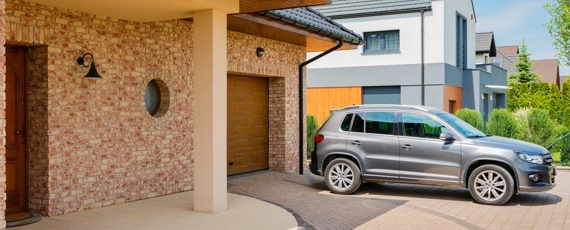Tips for Storing Your Idle Vehicle or Maintaining Your Vacant Property

Vehicle Storage Tips
If you are planning on storing your vehicle or keeping it idle for a significant period of time during the COVID-19 pandemic, there are several things you can do to protect it. Please see the advice below to help keep your vehicle safe and ensure it operates as expected when you need to use it regularly again.
Maintenance
- Check the fluid levels and ensure all are topped off. This is particularly important for the gas tank and motor oil as it helps prevent moisture build-up.
- If you change your oil, drive the vehicle a bit to circulate the oil before storing it. Clean your vehicle inside and out. A clean car resists rust much better. A clean automobile interior will help ensure pests don’t have a reason to visit your vehicle.
- Regarding battery maintenance:
- Start and run your engine no less than once a week. Remember that this needs to be done in a non-enclosed space due to the risk of a carbon monoxide build-up.
- Use a charger for periodic battery maintenance, if you have one.
- If you do not plan on using the vehicle at all for a longer period of time, you should also consider removing the battery from the vehicle and storing it separately in a cool, dry place.
- Consider asking your mechanic if any additional work should be done before storing your vehicle.
Storage
- Note that storing your vehicle in a garage or other covered/enclosed space will help protect the paint and prevent vandalism or theft.
- Use your parking brake only if it is necessary. This can add to the wear on your brake pads.
- The risk of flat tire cans be mitigated by parking your car on jacks, pieces of wood, or concrete blocks.
- Top up the air (or nitrogen) in your tires before storing.
If you require information about how storing a vehicle can affect your insurance, please contact your Marsh’s Private Client Services licensed insurance broker.
Keeping Your Cottage or Home Safe While Unattended
If you plan on leaving your home, cottage, or other property unattended for a significant period of time during the COVID-19 pandemic, there are several things you can do to protect it. Please see the advice below to help keep your property safe and ensure its condition is as expected when you need to use it regularly again. Note that you may need the help of a professional, in some cases, to perform the maintenance tasks suggested.
Wildlife and Pests
- The attic is the place, in most homes, that wildlife may sometimes intrude and remain undetected for a period of time. Check this space to see if you have a problem with mice, rats, squirrels, raccoons, wasps, birds, or other wildlife.
- Use plastic sheeting to protect your mattresses and bedding. This will help keep any rodents out.
- Unwanted pests may use open chimney flues, fireplace doors, and stove pipes to enter your home. Remember to close them.
- Remove any food (except canned foods) from the property as it could attract animals.
- If the dwelling is a cottage, and bears are problem, consider investing in heavy shutters for the windows.
Basic Advice
- Ensure someone checks on your property periodically — whether it is a neighbour or a contracted property management company.
- Check if maintenance is required to trim tree branches that could damage power lines close to your property.
- Securely store any recreational vehicles such as canoes, kayaks, and ATVs.
- Consider posting a notice on your door indicating there are no valuables on the site to help deter thieves.
Water Damage Risk
- Ensure the gutters are clear to prevent water issues.
- Turn off the water.
- Check that any floating docks are secured or brought safely on land.
- Remember to check that the sump pump is working, if you have one.
Fire Risk
- Turn-off the power (unless it will affect an alarm system or sump pump).
- Test your warning devices (e.g. smoke alarms or carbon monoxide detectors). Replace batteries as required.
- Ensure fireplace chimneys or exhaust pipes for your woodburning stoves are clean.
- Unplug refrigerators or any other appliances if the power has to be left on.
If you require more information about how unattended homes or cottages affect your insurance, please contact your Marsh’s Private Client Services licensed insurance broker.
This document and any recommendations, analysis, or advice provided by Marsh (collectively, the “Marsh Analysis”) are not intended to be taken as advice regarding any individual situation and should not be relied upon as such. This document contains proprietary, confidential information of Marsh and may not be shared with any third party, including other insurance producers, without Marsh’s prior written consent. Any statements concerning actuarial, tax, accounting, or legal matters are based solely on our experience as insurance brokers and risk consultants and are not to be relied upon as actuarial, accounting, tax, or legal advice, for which you should consult your own professional advisors. Any modelling, analytics, or projections are subject to inherent uncertainty, and the Marsh Analysis could be materially affected if any underlying assumptions, conditions, information, or factors are inaccurate or incomplete or should change. The information contained herein is based on sources we believe reliable, but we make no representation or warranty as to its accuracy. Except as may be set forth in an agreement between you and Marsh, Marsh shall have no obligation to update the Marsh Analysis and shall have no liability to you or any other party with regard to the Marsh Analysis or to any services provided by a third party to you or Marsh. Marsh makes no representation or warranty concerning the application of policy wordings or the financial condition or solvency of insurers or re-insurers. Marsh makes no assurances regarding the availability, cost, or terms of insurance coverage.

